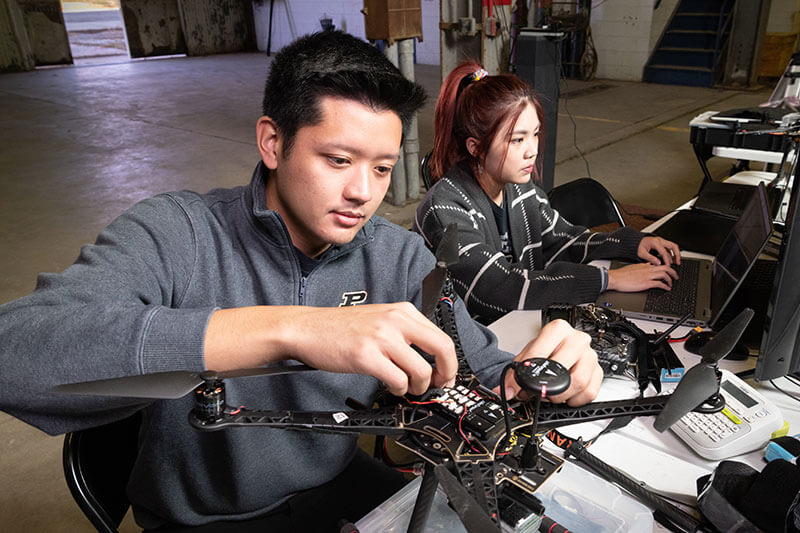Discussion on shaping AI in the physical world features industry leaders

Purdue University Institute for Physical AI launches new panel series March 26
WEST LAFAYETTE, Ind. — The Purdue University Institute for Physical Artificial Intelligence (IPAI) will host industry and research leaders March 26 for a panel discussion on the future of physical AI. The event, titled “Shaping AI in the Physical World: Emerging Challenges and Opportunities,” will include representatives from Amazon, Argonne National Laboratory, Caterpillar, Southwest Airlines and Purdue. It is the first discussion in a series on research at the intersection of AI and the physical world.
The panel will be held from noon-1 p.m. at the Bill and Shirley Rice Design Studio in the Materials and Electrical Engineering Building on Purdue’s campus and will also be broadcast online. Registration is required. Please register here. For in-person attendees, lunch will start at 11:30 a.m.
“Increasingly, AI will be embedded into the physical systems that surround us. These are changes fueled by technology, but also raise critical social, economic and policy questions,” said Karen Plaut, executive vice president for research at Purdue. “As society changes, we have to answer questions about what kind of world we want to live in, and how we can shape physical AI to serve those goals.”
IPAI focuses on the application of AI with elements of the physical world, research spanning four pillars:
- We Make. Supporting physical AI for manufacturing in Indiana and beyond.
- We Move. Translating Purdue’s expertise in supply chain, fuels, mechanics, and more to drive new knowledge in autonomous transportation.
- We Grow. Applying expertise in forestry and agriculture to help farmers apply the right amount of nutrients, insecticides, and herbicides at the right time and places to protect the environment.
- We Thrive. Intergrating bench-to-bedside expertise across health care disciplines to improve digital health care with improving diagnostics and treatment.
As technology develops, cyber-physical systems will become more prevalent. Examples include monitoring and optimizing manufacturing facilities for sophisticated equipment, pharmaceuticals and crops; monitoring natural resources; autonomously operating vehicles; and serving in hazardous situations.
The increasing use of such systems raises social, policy and economic questions, which will be topics for the panel, said Saurabh Bagchi, professor of electrical and computer engineering and member of the IPAI Steering Committee, who will moderate.
“Looking ahead, we know this is going to be a bigger shift than the first industrial revolution. So how can we prepare?” Bagchi said. “What does this mean for the workforce of the future? How do we deal with workforce displacement? What policies do we need to navigate questions of data collection and ownership? How are these systems going to pay for themselves?”
The panelists are:
- Somali Chaterji, assistant professor of agricultural and biological engineering at Purdue.
- Jim Katter, director of engineering, artificial intelligence at Caterpillar.
- Anthony Gregory, chief operating officer at Southwest Airlines Renewable Ventures.
- Arvind Ramanathan, computational biologist at Argonne National Laboratory and senior scientist at the University of Chicago Consortium for Advanced Science and Engineering.
- Shiv Vitaladevuni, director of applied science, Amazon.
IPAI is part of the Purdue Computes initiative, which includes investments in Purdue’s computing faculty and in research on physical AI, semiconductors and quantum technologies.
About Purdue University
Purdue University is a public research institution demonstrating excellence at scale. Ranked among top 10 public universities and with two colleges in the top four in the United States, Purdue discovers and disseminates knowledge with a quality and at a scale second to none. More than 105,000 students study at Purdue across modalities and locations, including nearly 50,000 in person on the West Lafayette campus. Committed to affordability and accessibility, Purdue’s main campus has frozen tuition 13 years in a row. See how Purdue never stops in the persistent pursuit of the next giant leap — including its first comprehensive urban campus in Indianapolis, the new Mitchell E. Daniels, Jr. School of Business, and Purdue Computes — at https://www.purdue.edu/president/strategic-initiatives.
Writer/Media contact: Mary Martialay mmartial@purdue.edu
Source: Saurabh Bagchi, sbagchi@purdue.edu